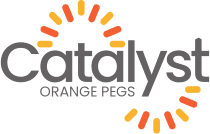Agile, not Aimless
Being Agile doesn't mean there isn't careful planning put into each experiment or project you tackle. It means that the follow-up sequence you enact after a project is completed is reactive to the outcomes of previous projects and the context of the day.
Agility, in fact, requires strong planning and organization skills along with the ability to templatize repeating tasks and exercises.
Structure
A 2-week cycle (or "sprint") is a common period of time for measuring sprints because it gives you enough time to analyze AND execute.
Thus, it's logical to assume that the framework we're going to present here is based on a typical 2-week sprint cycle.
Launch
Bring your projects and experiments to launch by spelling out what should get accomplished in each week. It's important to create an MVP deadline that is realistic but also aggressive. It's also important to embed steps and milestones that motivate the proper, timely outcome.
When we launch a new client, there is a 3-week period focused purely on 3 things:
- North Star alignment
- Strategy
- Concept tests
By the end of launch we haven't actually finished the MVP, but we're moving forward with testing ideas we generated through the alignment & strategy exercises conducted in the first days of the engagement. This takes a lot of pressure off of launching with a finished product, and it also gives us baseline metrics that are often used to make final decisions in the MVP.
The sooner we get into Sprint mode, the better. Once we do, the structure changes to that 2-week cycle
Week 1
- Analysis
- Ideation
- Development
Week 2
Catalyst, with the help of the Experimental Marketing Certification by Orange Pegs, helps businesses achieve Agile transformation by providing the collaborative framework and necessary infrastructure for tracking, prioritizing, and executing your best ideas in 2-week sprint cycles.
Click HERE for early access.

